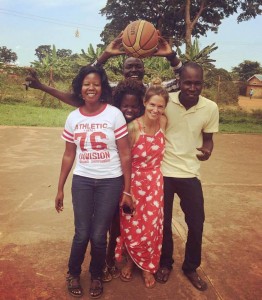I’ve been back in the US for over a month now and I’ve been trying to find a way to wrap my head around expressing my feelings about my final weeks as well as the fellowship overall. It’s been an intense experience with a steep learning curve and although I’m happy to be back home the re-integration process has also been jarring. How do you sum up a summer of work to people in a soundbite? In a blog post? I don’t know, but here is my best shot.
I spent my last week in Uganda in Kampala, which was a good transitional spot but also kept me acutely aware of some of the strong cultural differences that existed. While I was there I got the opportunity to meet with an organization that was doing similar work that the GDPU was doing and I hoped to set the stage for a partnership in the future.
Speaking with the program manager of this organization was eye opening in terms of working within cultural norms. She told me that when approaching their projects the concern is getting the community behind the project because unless the community feels like it is something they are connected to, something they can really say is theirs, it is difficult to make the project sustainable.
That thought was reinforced on my plane ride home from Entebbe to Dubai when I sat next to two Ugandan gentleman who now live in the UK. They explained the long history of the corrupt political system and the history of war that they had both experienced. I must admit, when hearing about the corrupt government in Uganda it feels frustrating and overwhelming to think about how an outside project can make an impact, which only adds to the challenges of any program. However, one of my fellow travelers, a Minister who grew up in central Uganda and works on setting up small, local programs said “what we need to do is get the people of Uganda to want to do something to make where they live a better place.”
To me, this was the crux of a lot of things. Gulu has been through a lot. Uganda as a country has been through a lot. I can’t imagine what it must be like to wake up every day and not be sure if you or a family member will live or if the life you have worked hard for will be taken away from you. These are things that are real, so I can understand how it is difficult to think about a long term plan. How can you think about long term if you are concerned with your immediate survival? This is an important piece of knowledge going into building any kind of project. The people of Gulu are smart, capable and resilient, but from my experience, understandably also harbor a bit of skepticism about outside projects intended to help them.
So in a nutshell, that was the “international development” experience of my summer but then there is that whole other piece of internal reflection and growth.There is always more to learn about yourself…even when you think you’ve got a handle on things. Honestly, I went into this summer thinking the culture shock wouldn’t impact me so much. I’m over 30, I’ve had lots of shocking encounters as a social worker, I feel like I have an understanding of things in the world, I WANT to be able to understand different cultures as much as I can. All of this led me to believe that although the fellowship would no doubt be challenging, I had the skills to get through it.
Yes, I do have the skills and knowledge to get through it- that doesn’t mean it was easy. I learned so much about myself: good bad and ugly. I have seen things in myself I though weren’t a part of me anymore. That’s a gift regardless of how hard it is to appreciate in the moment. Part of me being able to truly help others comes from me recognizing my strengths and weaknesses. This experience helped me see myself with some more clarity and helped me to refocus on how I can make the best use of myself to help others.
Posted By Amy Gillespie (Uganda)
Posted Oct 11th, 2016


